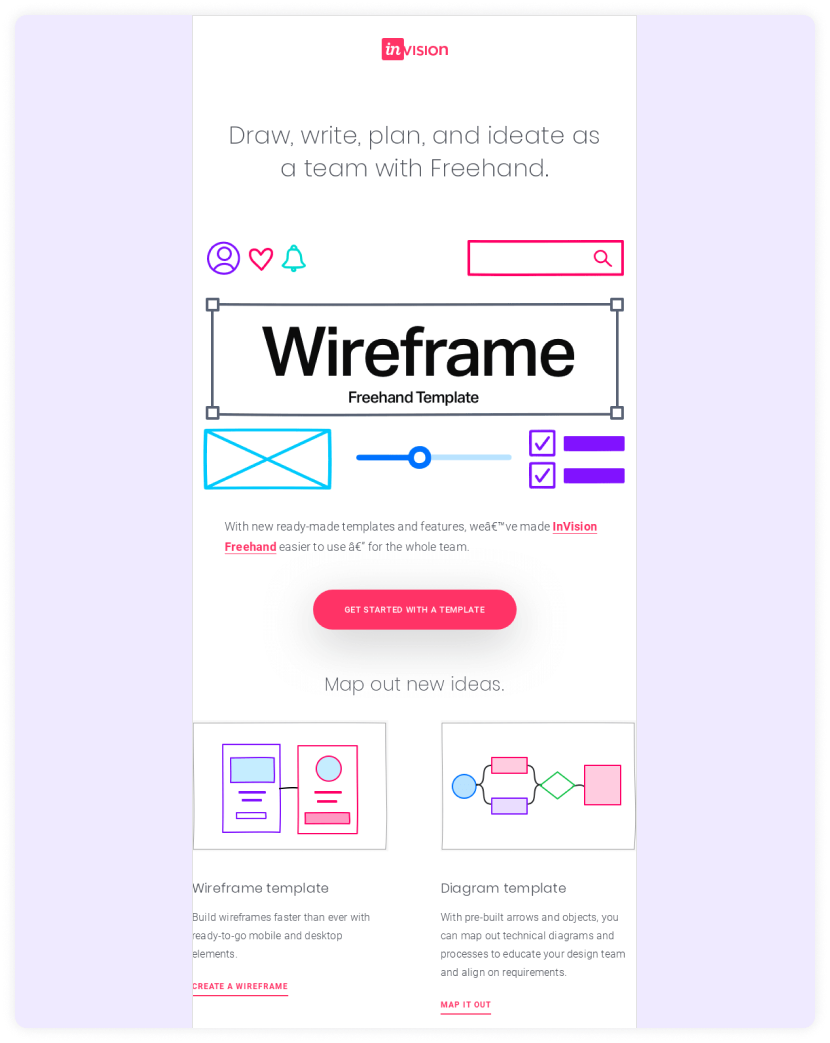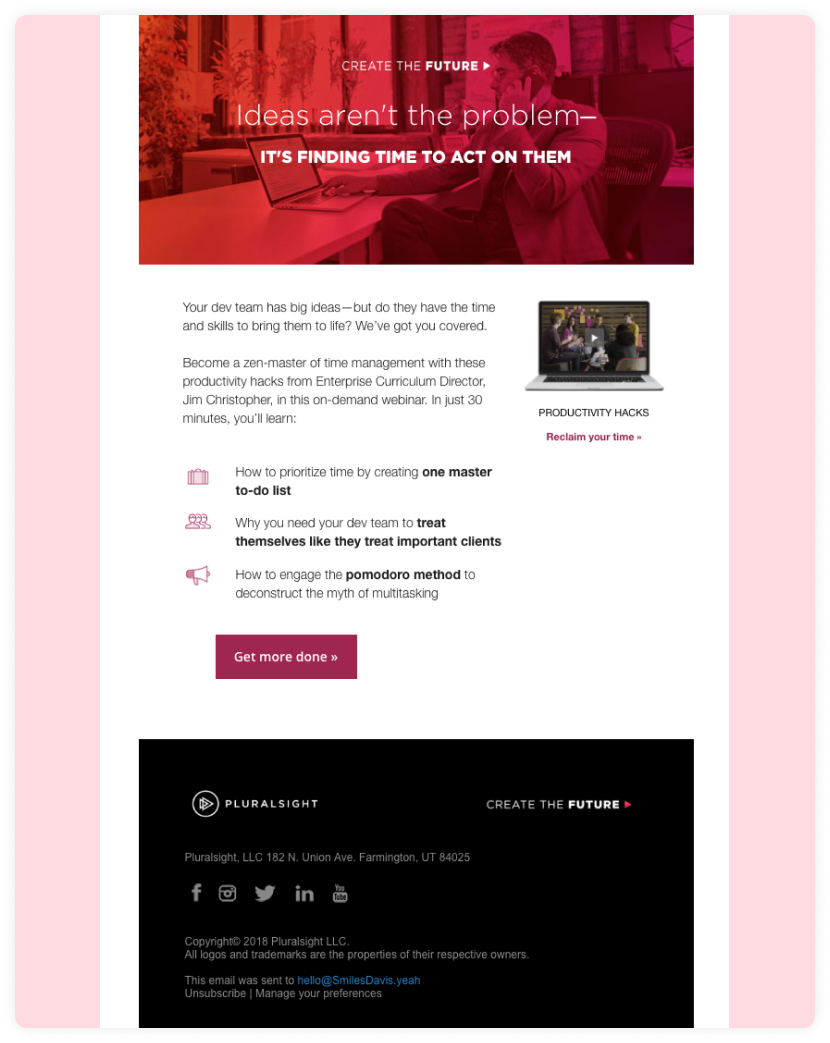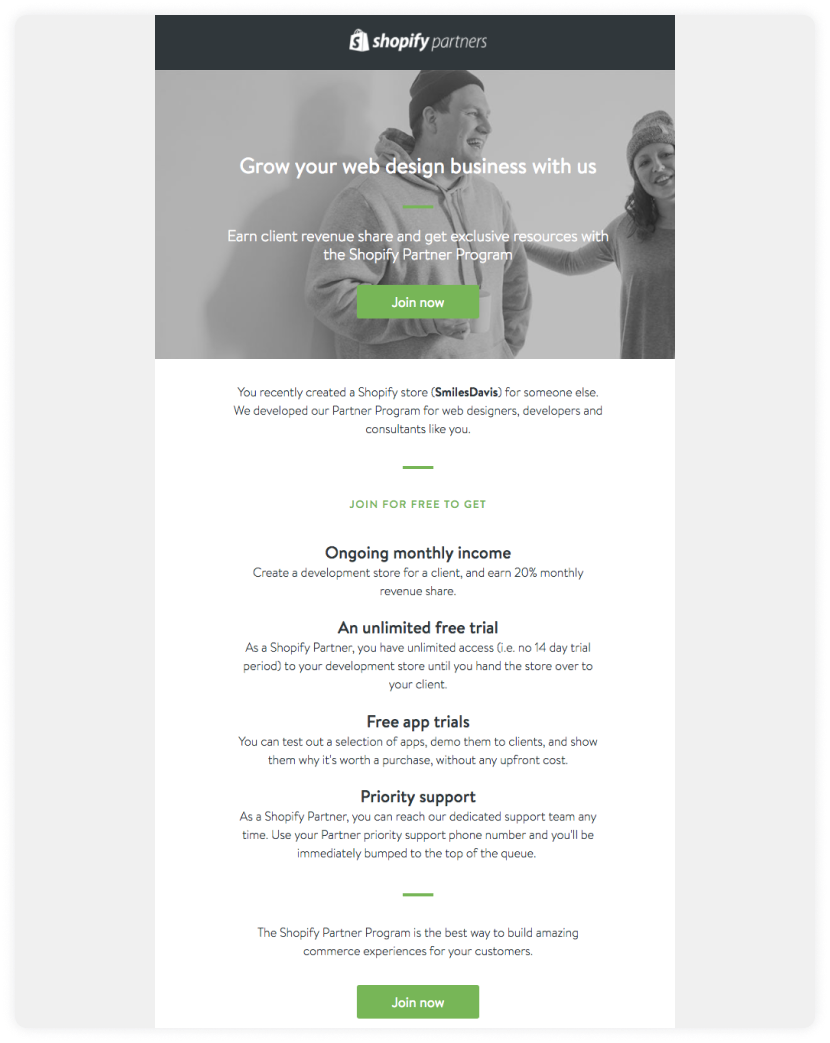Should I have a B2B email marketing strategy, or should I just cold email prospective leads? Which one is easy to implement and will give me results?
If you are asking such questions, chances are you are still skeptical about using email marketing for B2B. A common misconception is that the latter is easy to execute; just pick leads and send them emails. But converting those leads into prospective customers won't happen with this approach. You need an effective B2B email marketing strategy for that.
That's what we will be covering in this guide. We will uncover the basics of B2B emails and then move on to actionable strategies with great B2B email examples you can take inspiration from.
Table of contents
- What is B2B email marketing?
- Why should you use email marketing for B2B?
- B2B vs. B2C email marketing
- How to create compelling B2B email campaigns
- Best practices to do B2B email marketing the right way
- 3 amazing B2B email marketing examples
- Skyrocket your B2B conversions with AMP emails
- Conclusion
What is B2B email marketing?
B2B or business to business email marketing involves sending emails to business owners or professionals rather than individual customers. You generate B2B leads, nurture them with email campaigns and convert them into Marketing Qualified Leads (MQLs)** for the sales team.
For example, if you are an email service provider, your target audience can be influencers, startups, and marketers who want to send emails to their customers using your services.
While reaching out to the B2B audience, you should:
Understand their pain points.
Let the recipient know how your product/service can help them.
Back up your pitch with case studies, testimonials, data.
Keep updating them with new features and functions.
B2B email marketing involves your marketing and sales team. While the marketing team develops email campaigns to generate MQL, the sales team converts qualified leads into paying customers.
Why should you use email marketing for B2B?
The DMA 2021 Marketer Email Tracker suggests that email marketing is one of the highest revenue-generating channels as email ROI increased from 47.75 USD in 2020 to 51.52 USD in 2021.
This makes emails an economical marketing channel as you can get more conversions and results by investing fewer resources. And with the emergence of artificial intelligence, automation, and machine learning, your work gets greatly reduced once you meticulously set up your email campaign.
Moreover, as per Backlinko, 59% of B2B marketers cite email as their top channel for revenue generation due to higher ROI. And Content Marketing Institute reveals that 87% of B2B marketers say email is one of their top free organic distribution channels.
Besides, email offers you direct communication, and you can create campaigns for specific segments, unlike social ads, which are shown to a large audience.
So, you will miss out on a lot if you are not implementing email marketing in your marketing strategy to capture B2B leads and drive sales.
B2B vs. B2C email marketing
Before moving forward, we must clarify the difference between B2B and B2C email marketing approaches.
Both B2B and B2C aim to build a lasting relationship with their customers, retain them, and generate revenue. But, there are some differences in the email marketing approach, which we clarify in the table below:
| Basis | B2B | B2C |
|---|---|---|
| Target audience | Decision-makers or stakeholders associated with an organization. | Individuals. |
| Decision makers | Many teams, such as the sales and marketing teams, are involved before they process the purchase of your product or service. | No other party is involved other than the individual customer. |
| Goal | Educate the reader about your product/service, nurture them, move them from MQL to SQL and move them through the sales funnel to convert into paying customers. | The main purpose is to push the recipient towards making a purchase. |
Also read: A Comprehensive Guide To B2C Email Marketing
How to create compelling B2B email campaigns
Follow the below-mentioned steps to create an effective email marketing campaign for B2B leads:
1. Determine trackable goals and the right KPIs.
It all begins with defining goals or objectives you want to achieve through your email marketing campaigns. These goals are the foundation for planning, creating, and executing your B2B strategy. Your B2B goals can be to get more demo bookings and overall signups, generate MQL for the sales teams, reach new personas, etc.
Your Key Performance Indicators (KPIs) are how you measure your objectives using different metrics. KPIs can be open rates, click-throughs, MQL to SQL conversions ratio.
| Objective | KPIs |
|---|---|
| Increase brand awareness | Monthly traffic to your website through email campaigns |
| Increase email engagement | Open, click-through rate |
2. Build empathy and experience map
An effective approach for building your email list is identifying your target persona. This is where the empathy and experience map comes in.
An empathy map consists of questions you should answer to help you build your target person depending on your industry and objectives. You should try and answer these questions:
What are your audience's demographics: Gender, Age group, occupation, company size, ethnicity, etc.
Values and beliefs they follow or feel strongly about.
Their pain points and how your brand can help solve them.
An experience map is like taking a plunge into your customer journey and really understanding them. Here are some of the questions you should answer:
How does the prospect find you? What's the first point of contact? Do they initiate it or your?
What content (articles, webinars, whitepapers, reports) is available to educate the prospect? Does this piece of content answer your prospect's questions? How is this content interesting and informational to them?
What little nuggets do you offer to motivate the prospects to opt-in for your email list?
Answering these questions will lead you to your target personas which you can then reach out to through various acquisition strategies and make them part of your email list.
We discuss 11 effective tactics for building a decent-sized email list in our guide - 11 Email Acquisition Strategies to Grow Your Subscriber Database.
3. Select a reliable ESP
Once you have your email list and goals, you need to seek out the right Email Service Providers (ESP) to run your email campaigns. ESPs will help create, run, and track your email campaigns, giving valuable insights into optimizing future campaigns.
Before you finalize any ESP, make sure it checks all these basic boxes:
Fits your budget.
Have an extensive analytics tracker.
Allow you to send personalized campaigns.
Offer integrations.
Offers automation.
You can read our guide on How to Choose an Email Service Provider to select the best ESP for your B2B email campaigns.
4. Create relevant email campaigns
Here comes the actionable stage where your marketing team gets their creative juice flowing assisted with their target personas.
The experience map that you used to identify your target persona is also helpful in sending relevant content through email. For that, try to answer these questions:
Which content will make them more aware and familiar with your services and products?
How would you reflect your USP and build trust among your prospective leads?
What does the prospect need to know to make an informed decision to convert?
What do they need to believe and experience to be delighted to become a client or customer?
Answering these questions will give you ideas of composing your email and what to write in your email copy.
Remember you are sending emails to another business owner, so they will likely identify when you sound too salesy! So, focus on connecting with the first few emails and then study the prospect's interaction with these emails. If they seem interested, nudge them with content that reflects how you help them solve their pain points.
As Ann Handley, Digital marketing pioneer, and writer, says,
"Make the customer the hero of your story."
Because in marketing, no one likes to see a brand-boosting themselves. Instead, what matters is how well you address customers' pain points and develop ways to solve them efficiently and drive their business revenue.
5. Automation is your BFF
We say this because email automation can drastically reduce your work while increasing your campaign's performance. But, to leverage automation, you need to plan your email cadence meticulously. For effective automation, you need to study your prospect's behavior and journey and set up a trigger email sequence sent after taking a certain action.
For instance, a prospect clicked on a link in an email to your ebook landing page. They downloaded the ebook. Then you can use this data to send the next email, which can be other relevant resources to educate them further.
To ensure you are not overwhelming the reader, define these criteria accordingly:
Timing: When to send the next email in the automation series.
Cadences: The interval between each email.
Frequency: Don't overwhelm the reader by nudging them with frequent emails. It will only push them towards the unsubscribe link. Thus, adhere to a frequency that seems optimal and keeps them engaged.
Related guide - A Beginner's Guide to Creating Email Sequences That Drive Conversions
Best practices to do B2B email marketing the right way
We have suggested 6 major best practices to ensure the effectiveness of your email campaigns:
• Check email deliverability factors
What's the point of putting effort into designing and writing the perfect email just to see them go down the spam folder! To avoid such unjust scenarios, ensure that your emails are actually landing in the inbox. Here are the most important criteria you need to check are:
Ensure you pass the email authentication criteria: SPF, DKIM, and DMARC.
Avoid using spam trigger words in the subject line such as JACKPOT, FLASH SALE, WIN 100% CASHBACK.
• Make your email personalized to the target recipient
No one likes to receive a non-personalized generic email that sounds like some robot has written it. To stand out in the user's inbox, you need personalization. As per Litmus state of email report 2021, 80% of marketers use prospect's name, company name, and profile data for personalizing emails.
Read in detail: An Ultimate Guide to Creating Personalized Emails
• Send emails at the right time
Giving you a definite day and time to send emails to your B2B will probably not work as timings relate to your industry, target audience, and email types.
But, you can get references from these surveys done by big marketing brands on the best time and day to send email to B2B leads.
| Brand | Day of the week | Time |
|---|---|---|
| Sendinblue | ||
| Saas | Wednesday | 2:00-3:00 p.m |
| Professional services | Monday or Tuesday | 8:00-10:00 am |
| Hubspot | Saturday | 10 am |
Finding the right time is about segmenting your leads further based on their job position working hours. This segmentation approach will give you deeper insight into their behavior to get higher opens and clicks.
Related guide: How to Find the Best Time to Send Emails
• Don't forget to add a fallback version of the HTML email
Support for email format and email elements such as images, GIFs, buttons aren't uniform across email clients. Thus, to avoid embarrassment in front of your prospect, always add a fallback version of your email.
For example, if an email client doesn't render your HTML email, you can have a fallback version as a plain text email.
Read in detail about email client support: Can I email
• Track the right data
Just tracking the email data and qualifying leads based on that data will not work as it will affect the quality of leads. Instead, use your website analytics, email analytics, and customer relationship management (CRM) analytics to get a holistic view of prospects' behavior and draw insights based on these platforms.
A list of the most widely used tools you can choose from is as follow:
| Website analytics tool | Email analytics tools | CRM |
|---|---|---|
| Google analytics | Mailmodo analytics | Hubspot |
| Optimizely | Litmus analytics | Segment |
| Adobe analytics | Mailgun | Salesforce |
• Preview and test emails for better results
Previewing your emails before you send them is crucial as it will help you identify formatting errors, typos, grammatical mistakes, etc.
Besides, you can create two different versions of a single email and run A/B tests to see which one gets you the better results. Then, you can use that one to send to prospects and get higher engagement.
3 amazing B2B email marketing examples
Here are our three best picks for B2B email, which ticks all the right boxes:
1. Invision
Subject line: New for Freehand: Templates for brainstorms, wireframes, and more

Source: Really Good Emails
What makes it a good B2B email?
The subject line is clear, and words like brainstorms and wireframes are common among teams, so it hits right to the point.
There is adequate white space which makes graphics and CTA stand out.
Each section highlights the benefits of each template.
One clear call to action.
2. Pluralsight
Subject line: Got big ideas? 3 productivity hacks for your developers.

Source: Really Good Emails
What makes it a good B2B email?
The subject line sums up what to expect in the email.
The headline answers the recipient's pain points - they might have ideas but don't know how to execute them.
Bullets points improve legibility.
Clear call to action.
3. Shopify
Subject line: Join the Shopify Partner Program

Source: Really Good Emails
What makes it a good B2B email?
The subject line hits right to the point. Not clever.
The banner highlights the key benefits of joining the partner program with an actionable CTA right below that.
The banner is enticing enough to get the recipient to click on the CTA. But, if they don't, Shopify elaborates on benefits further in the email.
- Ending an email with a 2nd and similar CTA.
Skyrocket your B2B conversions with AMP emails
Would you believe that you can skyrocket your form submission, event registrations, and demo bookings 2X times?
You probably won't!
But, it's possible with AMP emails. These emails allow your recipient to submit the form to confirm webinar registration right inside their emails. It reduces those painful redirects and allows users to take action right away. And that's how Mailmodo helps the brand bring interactivity within the email.
Razorpay, a leading fintech brand, saw 257% response in their NPS survey submission using the AMP emails.
Shubhash dash, the Growth marketer at Razorpay, shared his thoughts with us,
"We saw a massive 250% increase in responses to our NPS survey emails. Our merchants loved the email as it enabled them to share their thoughts with us without even getting redirected once."
Conclusion
Your B2B email marketing strategy is nothing but the marriage between your marketing and sales team. The marketing team devises email campaigns to generate and nurture leads to qualify them for the sales team. The sales team builds customer relationships and moves them through the sales funnel to convert them into paying customers.
To do it effectively:
Set trackable goals, build an email list, select a reliable ESP, and create compelling email campaigns.
Make these emails personalized to target the right audience with clickable subject lines and CTAs.
Remember, B2B leads are not just signing up for your products/services, but they are also investing in your expertise and support to help their business grow.
What you should do next
Hey there, thanks for reading till the end. Here are 3 ways we can help you grow your business:
Talk to an email expert. Need someone to take your email marketing to the next level? Mailmodo’s experts are here for you. Schedule a 30-minute email consultation. Don’t worry, it’s on the house. Book a meet here.
Send emails that bring higher conversions. Mailmodo is an ESP that helps you to create and send app-like interactive emails with forms, carts, calendars, games, and other widgets for higher conversions. Sign up now and send 10k free emails/month. Sign up here.
Get smarter with our email resources. Explore all our knowledge base here and learn about email marketing, marketing strategies, best practices, growth hacks, case studies, templates, and more. Access guides here.

